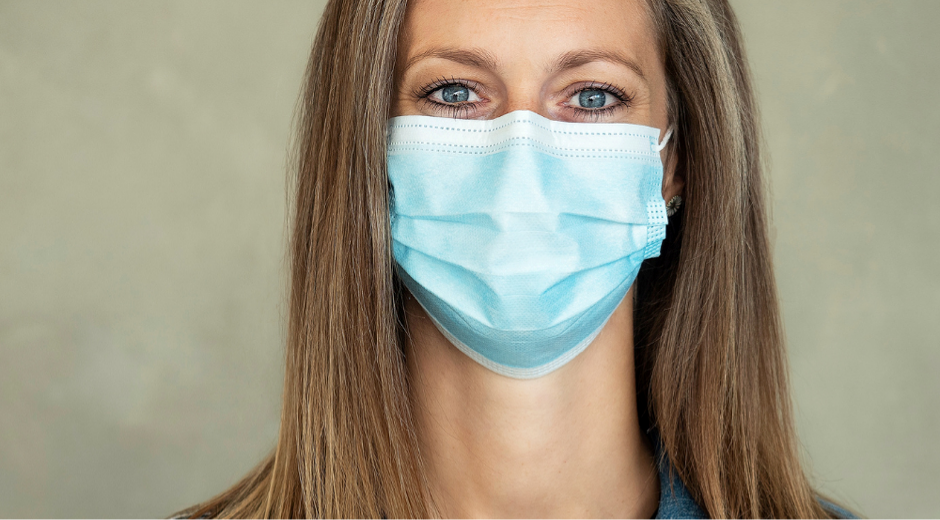News
SDU researchers and ABENA join forces to create face masks that neutralize and alert about the corona
Tuesday, November 17, 2020
Nanoscientists from SDU and Abena, a production and trading company, want to create a face mask that not only neutralizes the coronavirus but also alerts the user when the face mask comes in contact with the virus.

“We believe so much in the technology that we are embarking on the initial trials so that we can hopefully get the face mask on the market as soon as possible. A face mask that encapsulates and neutralizes the corona, and at the same time alerts the user when your face mask is exposed to the virus. That way, the face mask can also act as a tracking tool."
This is what Jacob Marcussen believes. Jacob is from the South Jutland distributor of protective equipment, ABENA, who among other things, sell hand sanitizer, visors, and face masks. And the face mask is exactly what it's all about. It is the face mask which has become an inseparable companion in your daily life since the government introduced several new restrictions on October 23 to curb the COVID-19 pandemic, including the requirement to wear a face mask.
Microparticles will encapsulate and neutralize viruses
ABENA has joined forces with Professor Yogendra Mishra and Associate Professor Roana de Oliveira Hansen from NanoSyd at SDU in Sønderborg to develop a face mask that can become a powerful weapon in the fight against COVID-19.
Professor Yogendra Mishra works with so-called tetrapod’s, which are microparticles coated with zinc oxide, which have viral binding abilities and can therefore act as advanced virus protection in face masks and other protection measures such as visors.
“The microparticles bind to the surface proteins of the coronavirus, called Spike (S), which is what is seen as the crown or halo that resembles the corona of the sun, which has given the coronavirus its name. The virus becomes encapsulated and therefore cannot bind itself to the cells in our body. The concept itself and the technology are cheap, simple, and quick to manufacture on a large scale,” says Yogendra Mishra.
The professor adds that the microparticles have shown incredibly strong antiviral properties against other viruses, such as herpes. Furthermore, the microparticles are not harmful to humans.
The sensor will alert the user
Associate Professor Roana de Oliveira Hansen researches, among other things, sensitive sensor systems that can measure the organic molecules that make up the outer layer of the coronavirus. The goal is for the face mask, with a small battery device attached, to alert the user when the sensor detects the coronavirus.
"If the potential of the sensors in the microparticles is as high as we expect based on our research, then the face mask will be able to emit a signal via a very small and a compact piece of electronics, which will not bother the user at all," says Roana de Oliveira Hansen.
The small electronic device would then be able to send information to the user's mobile and also to the state's stop infection app.
Not on the market this year
When directly asked when the product realistically can be on the market, Jacob Marcussen from ABENA is a bit hesitant.
“The technology and the concept must be thoroughly tested, and then a production apparatus must be set up. I hope it can be ready before the summer of 2021, but I must also acknowledge that it can take up to a year. It is an innovation process, so things can take time and you become wiser in the process. This is a project which we are giving high priority due to the actuality of the issue and we also hope to receive funding so that we can give a further push to the process,” he says.
The technology can be used against other viruses
It can take up to a year before the nano-mask is on the market, and so it is reasonable to believe that a vaccine will be approved before, and the face mask will therefore be superfluous. But if you expect that as soon as a vaccine is ready, then everything will quickly be "back to normal", then you run the risk of being disappointed. It is likely to be the case. It will take time for the vaccine to be implemented, different groups will be prioritized and there may be challenges when it comes to the distribution of the vaccines.
Because the promising vaccines are still under development, we do not yet know how long people will be immune or whether a follow-up vaccination will be needed. Therefore, we are likely to experience a period where we still need to adhere to many of the restrictions that have been introduced during the pandemic - including the use of face masks.
“The idea is that technology can also be used for other viruses. I can safely say that the whole world was unprepared for this pandemic. We must learn from this pandemic so that we, as a society, are better equipped for any future pandemic. SARS, MERS, EBOLA, and Covid-19 are all examples of pandemics that have had huge worldwide. The common denominator is that it is a matter of tracing the infection and breaking the chain of infection. The goal is to make a product that can be used today, but to a large extent, also in the future. This project must contribute to that, ”says Jacob Marcussen.
SDU researchers and ABENA join forces to create face masks that neutralize and alert about the corona
/Default.aspx?ID=22179&newsid=767&Action=1¤tPage=4&M=NewsV2&PID=191247
